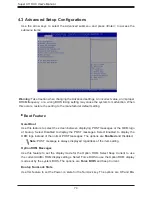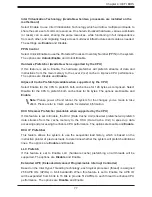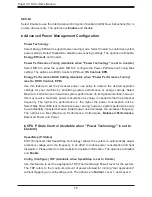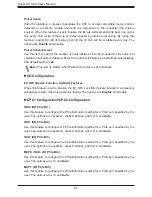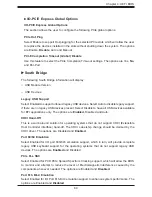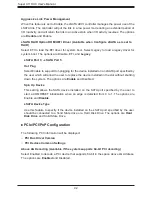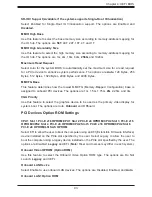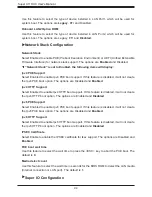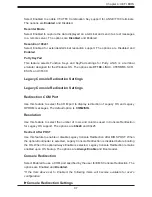
Super X11DAC User's Manual
82
and if the directory line is in A state, we must snoop all other sockets because another
socket may have the line in a modified state. If this is the case, a "snoop" will return the
modified data. However, it may be the case that a line "reads" in an A state, and all the
snoops come back with a "miss". This can happen if another socket reads the line earlier
and then has silently dropped it from its cache without modifying it. If the "Stale AtoS"
feature is enabled, a line will transition to the S state when the line in the A state returns
only snoop misses. That way, subsequent reads to the line will encounter it in the S state
and will not have to snoop, saving the latency and snoop bandwidth. Stale "AtoS" may be
beneficial in a workload where there are many cross-socket reads. The options are Disable,
Enable,
and
Auto
.
LLC Dead Line Alloc
Select Enable to opportunistically fill the deadlines in the LLC. The options are
Enable
,
Disable,
and Auto.
Isoc Mode
Select Enable to enable Isochronous support to meet QoS (Quality of Service) requirements.
This feature is especially important for Virtualization Technology. The options are Disable,
Enable, and
Auto
.
Memory Configuration
Enforce POR (Plan of Record)
Select POR to enforce POR restrictions for DDR4 memory frequency and voltage
programming. The options are
POR
and Disable.
PPR Type
Post Package Repair (PPR) is a new feature available for the DDR4 Technology. PPR
provides additional spare capacity within a DDR4 DRAM module that is used to replace
faulty cell areas detected during system boot. PPR offers two types of memory repairs.
Soft Post Package Repair (sPPR) provides a quick, temporary fix on a raw element in a
bank group of a DDR4 DRAM device, while hard Post Package Repair (hPPR) will take a
longer time to provide a permanent repair on a raw element. The options are
Auto
,
Enable,
Soft PPR, and Disabled.
Memory Frequency
Use this feature to set the maximum memory frequency for onboard memory modules. The
options are
Auto
,
1866, 2000, 2133, 2400, 2666, and 2933. (
Note
: Support for 2933 MHz
memory is dependent on the CPU SKU.)







